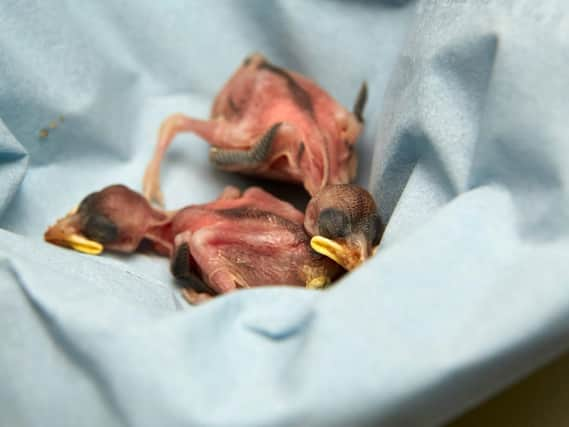Rescuing baby birds: RSPCA warns people to think before picking up a wild bird


Picking up a wild baby bird that seems to have fallen out of its nest is not always the best thing to do, RSPCA workers have warned today,
Last year, as more people were exploring the countryside during lockdown, the charity took a record 8,967 calls - five an hour at times - about orphaned, sick and injured baby birds during the peak hatching months of May, June and July.
Advertisement
Hide AdAdvertisement
Hide AdEighty-four of these calls were from Buckinghamshire. But sometimes people may have been literally killing the tiny creatures with their kindness,
Today an RSPCA spokesman has given guidelines about when to intervene and when to leave a baby bird alone.
"Birds take far better care of their babies than humans can, and should only be taken into care as a last resort," he said.
Around one third of all the calls (3,330) last year related to orphaned birds and another 3,252 were about sick and injured birds. The majority (4,611) were about fledglings (older baby birds that are starting to fly), which the RSPCA advises can generally be left to be cared for by their parents.
Advertisement
Hide AdAdvertisement
Hide AdThe charity also received 1,413 calls about nestlings - the very young baby birds - who will not survive out of the nest. Nestlings are highly vulnerable and more likely to need help.
The general advice is to avoid handling any wildlife unless absolutely necessary, always wear sturdy gloves and do not give baby birds or animals food or water.
RSPCA’s Scientific Officer Evie Button said: “Our wildlife centres are now on high alert as the baby bird season kicks off. As well as handling thousands of calls - around 9,000 - last year, more than 5,400 orphaned, injured or sick young birds were brought into our four specialist centres. That’s a lot of round-the-clock hand-feeding, monitoring and rehabilitation of all types of young birds, from cygnets, sparrows and swallows to guillemots, goshawks and gulls!
She added: “It’s wonderful that people want to do the best for our wildlife, but sometimes it’s difficult to know when to intervene and when to hold back. It is really important to ensure it is only those that really need help that are brought in, and in most cases, the best thing you can do for them is to help them stay in the wild using methods like re-nesting.
Advertisement
Hide AdAdvertisement
Hide Ad"If in doubt, our new, downloadable guides - one for fledglings and one for nestlings - are full of advice and can help to identify whether the young bird is a fledgling - which unless sick or injured, is likely to survive outside the nest without human intervention - or a younger, more vulnerable nestling, which will probably need extra help.”
You can access the guides here. They help people differentiate between nestlings and fledglings.
Nestlings are baby birds that have no feathers, or only a few. Nestlings won't survive long outside the protection of the nest and where possible nestlings should be re-nested and left in the wild, as birds take far better care of their babies than humans can, say RSPCA experts.
Fledglings have all or most of their feathers and leave the nest just before they can fly, so it's normal to see them on the ground. Keep pets away, leave the fledgling alone and monitor, as the parents are usually nearby and feeding the bird.
Advertisement
Hide AdAdvertisement
Hide AdEven if you have already confined a healthy fledgling you may still be able to return them to their parents. If they're in immediate danger, place it in a sheltered spot a short distance away.
In 2020, the RSPCA’s wildlife centres cared for nearly 3,000 (2788) ‘orphaned’ birds, picked up by well-meaning people. But many of these birds were not actually orphans and may have been better off left in the wild, they say.
"Unlike fledglings, if a nestling is spotted outside their nest, they need assistance. Actions may include creating a manmade nest, taking the nestling to a vet or local rescue centre, or calling the RSPCA," said the spokesman,
The charity also has specific information on their website for some species which may need different types of help, such as gull chicks, bird of prey chicks and ducklings, goslings and cygnets.
To help the RSPCA continue rescuing, rehabilitating and rehoming animals in desperate need of care, visit its website or call the donation line on 0300 123 8181.